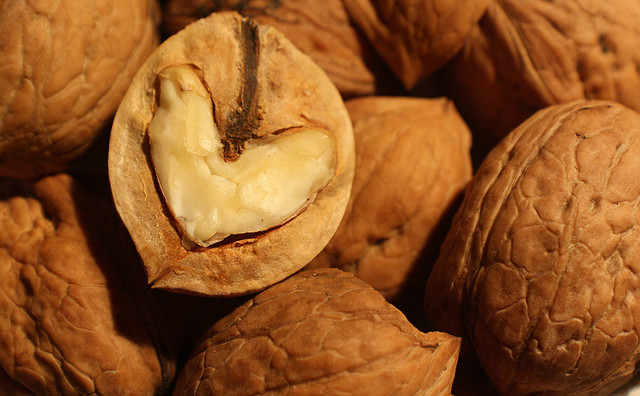While walnuts (Juglans regia L) are a fall harvested tree food with nutrient-rich deliverables that are ideal for winter, their overwhelming health benefits should nominate them for a year-round source of protein, healthy fats and phytonutrients.
Here are 10 reasons to make them a regular part of your diet:
- Rich In Omega-3
As most nuts are primarily mono-saturated fats, walnuts are loaded with the omega-3 and omega-6 fatty acids as well. It is the only nut that is rich in the omega-3, alpha linolenic acid (ALA), which converts to the heart—and brain-healthy EPA and DHA omega-3 fatty acids. Of all edible plants, walnuts are the highest source of ALA—with a whopping 2.7 grams per one-quarter cup serving. (1)
- Free Radical Scavenger
Walnuts have the highest polyphenol content in a survey of various raw and roasted nut types. (2) The tannins and ellagic acids deliver some 14 different polyphenols that boosted superoxide dismutase (SOD), which may be the livers most potent free radical scavenger. Free radical scavengers have been shown to support health heart, vascular, nerve, bone, blood sugar and brain health. (2)
- Antioxidants—Eat The Skin!
Be sure and eat the very thin skin that wraps the nut inside the shell. It is slightly bitter, but is stores the lion’s share of polyphenols. Some experts believe that 90% of them are found in the skin. Also because of the high fat content, they should be refrigerated if you are not going to eat them quickly. They last longer unshelled and, if refrigerated, they will last up to six months.
- Healthy Cholesterol
The high fat content of walnuts has been well-documented to support healthy cholesterol levels. Studies have shown that a diet rich in walnuts produce lower LDL cholesterol levels, by about 10 points on average. (3)
- Rich in Vitamin E
Walnuts are also high in the most active form of Vitamin E called gamma-tocopherol, which is well-known to support cardiovascular health.
- They Make You Smarter
Walnuts are perhaps most famous for their support for cognitive function. With a strong physical resemblance to a brain, they do indeed make a great brain food. In one study, eating just 1.5 ounces a day was shown to offer protection for an aging brain. (4)
- Reduce Brain Plaque
Walnuts have also been shown to inhibit the production of beta-amyloid plaque, which has been linked to long-term decline in cognitive function, memory and learning. (5)
- Aids Weight Loss
In one study, overweight adults with Type II diabetes who ate 1/4 cup of walnuts a day reduced fasting insulin levels compared to the group that did not eat walnuts. Excess insulin is one of the major contributors to excess storage of fat in the belly, hips and thighs. (6)
- Boost Sperm Count
Men who consumed 75 grams of walnuts which is just over 1/2 cup daily saw a significant increase in sperm count, motility and morphology. (7)
- Decrease Hunger
Eating walnuts for just three consecutive days was associated with a decrease in hunger and increase in satiety, which is linked to weight loss. (8)
~
References:
- Nutrients 2010, 2, 652-682; doi:10.3390/nu2070652
- Food Funct. 2012 Feb;3(2):134-40. doi: 10.1039/c2fo10152a. Epub 2011 Dec 21.
- Am J Clin Nutr July 2009 vol. 90 no. 1 56-63
- PR Newswire. March 30, 2015. New Findings Support the Benefits of Eating Walnuts on Overall Health
- Curr Alzheimer Res. 2004 Aug;1(3):183-8.
- Eur J Clin Nutr. 2009 Aug;63(8):1008-15. doi: 10.1038/ejcn.2009.19. Epub 2009 Apr 8.
- ClinicalTrials.gov Identifier: NCT01954498. Effect of Walnuts on Sperm Parameters and Male Fertility.
- Obesity (Silver Spring). 2010 Jun;18(6):1176-82. doi: 10.1038/oby.2009.409. Epub 2009 Nov 12.
~
Relephant Favorite:
Waylon with Ayurveda expert John Douillard on Oil Pulling & Baths 101.
~
Author: Dr. John Douillard
Editor: Travis May
Image: Flickr/Martin Fisch


 Share on bsky
Share on bsky





Read 0 comments and reply